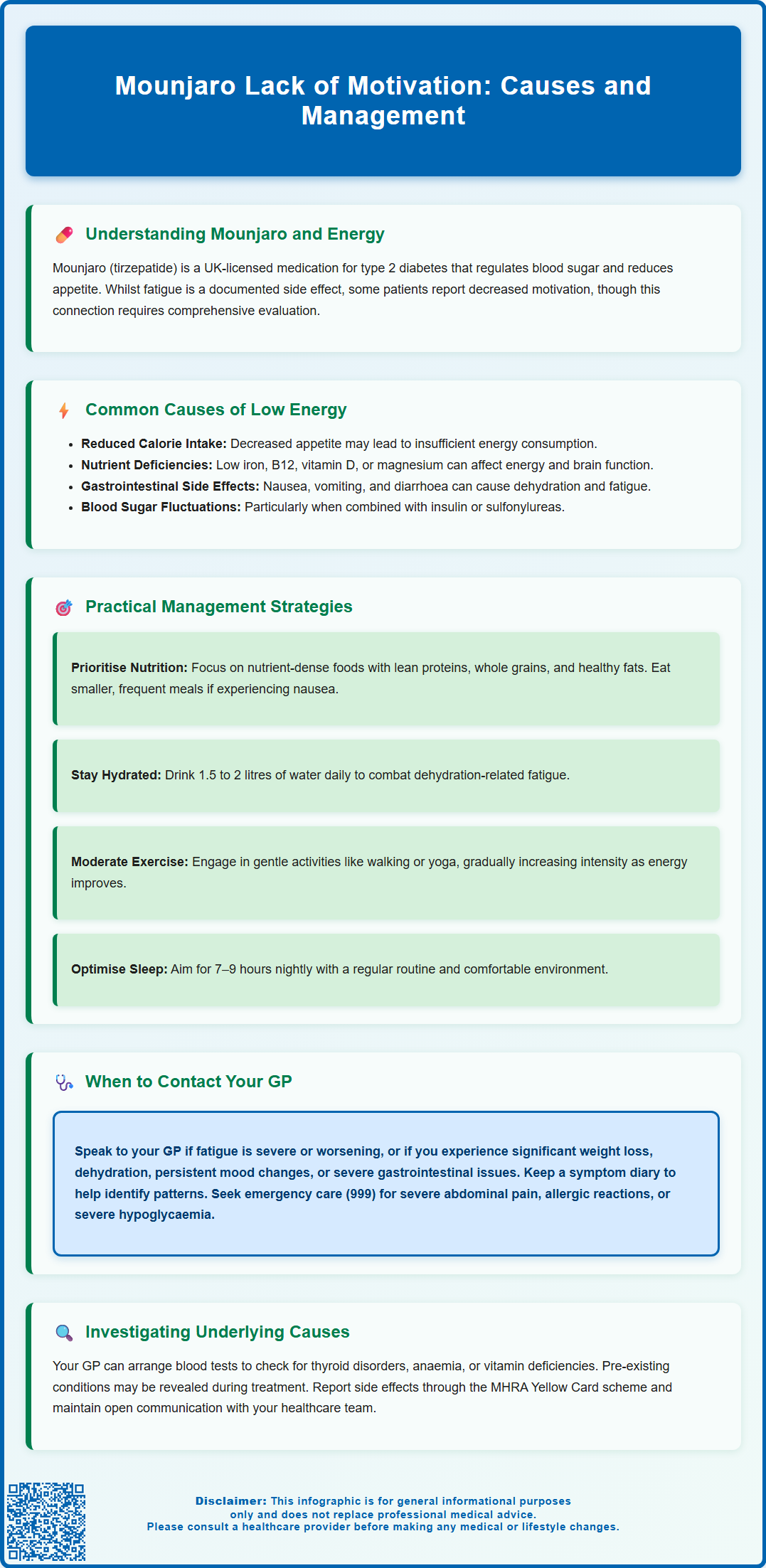Some individuals taking Mounjaro (tirzepatide) report experiencing reduced energy levels or a lack of motivation during treatment. Whilst 'lack of motivation' is not specifically listed in clinical trial data, fatigue is a recognised side effect of this dual GIP and GLP-1 receptor agonist. These symptoms may arise directly from the medication or indirectly through reduced calorie intake, gastrointestinal side effects, rapid weight loss, or nutritional deficiencies. Understanding the potential causes and knowing when to seek medical advice can help patients manage their wellbeing effectively whilst benefiting from Mounjaro's therapeutic effects for type 2 diabetes or weight management.
Summary: Lack of motivation on Mounjaro may result from fatigue (a recognised side effect), reduced calorie intake, gastrointestinal symptoms, rapid weight loss, or nutritional deficiencies rather than being a direct listed adverse reaction.
- Mounjaro (tirzepatide) is a dual GIP and GLP-1 receptor agonist licensed in the UK for type 2 diabetes and weight management.
- Fatigue is a recognised side effect; lack of motivation may occur indirectly through reduced food intake, nausea, or rapid metabolic changes.
- Inadequate calorie or nutrient intake can lead to tiredness, particularly if protein, vitamins, or minerals are insufficient.
- Hypoglycaemia risk increases when Mounjaro is combined with insulin or sulfonylureas, potentially contributing to low energy.
- Contact your GP if fatigue is severe, persistent, or accompanied by dehydration, mood changes, or severe gastrointestinal symptoms.
- Optimising nutrition, hydration, sleep, and monitoring blood glucose can help manage energy levels during treatment.
Table of Contents
- Understanding Mounjaro and Its Effects on Energy Levels
- Can Mounjaro Cause Lack of Motivation or Fatigue?
- Why Some People Experience Low Energy on Mounjaro
- Managing Motivation and Energy While Taking Mounjaro
- When to Speak to Your GP About Mounjaro Side Effects
- Scientific References
- Frequently Asked Questions
Understanding Mounjaro and Its Effects on Energy Levels
Mounjaro (tirzepatide) is a prescription medicine licensed in the UK for the treatment of type 2 diabetes. In the UK, tirzepatide is also available under the brand name Zepbound for weight management in adults with obesity or overweight with weight-related health conditions. Mounjaro belongs to a class of medications known as dual glucose-dependent insulinotropic polypeptide (GIP) and glucagon-like peptide-1 (GLP-1) receptor agonists. By mimicking these naturally occurring hormones, Mounjaro helps regulate blood sugar levels, reduces appetite, and slows gastric emptying, which collectively support weight loss and improved glycaemic control.
Whilst Mounjaro has demonstrated significant clinical benefits in trials—including substantial weight reduction and improved HbA1c levels—patients may experience a range of side effects as their body adjusts to the medication. Common adverse effects include gastrointestinal symptoms such as nausea, vomiting, diarrhoea, and constipation, particularly during dose escalation. Fatigue is also listed as a known side effect in the Summary of Product Characteristics (SmPC). These symptoms can affect energy levels and overall sense of wellbeing.
Some individuals report feeling less energetic or experiencing a lack of motivation whilst taking Mounjaro. Although 'lack of motivation' is not specifically listed as an adverse reaction in clinical trials or regulatory documentation, anecdotal reports suggest that changes in energy and motivation can occur. Understanding the potential mechanisms behind these experiences—and distinguishing between direct drug effects, secondary consequences of side effects, and coincidental factors—is essential for patients and healthcare professionals alike.
It is important to note that energy levels and motivation are influenced by multiple factors, including diet, sleep quality, physical activity, mental health, and underlying medical conditions. Therefore, a comprehensive approach is needed when evaluating these symptoms in the context of Mounjaro therapy.

Can Mounjaro Cause Lack of Motivation or Fatigue?
While 'lack of motivation' is not listed as a specific adverse reaction in clinical trials or regulatory data, fatigue is a recognised side effect of tirzepatide (Mounjaro) according to the product information. The exact frequency and severity can vary between individuals.
Fatigue and reduced motivation may also arise indirectly through several pathways. Gastrointestinal side effects—particularly nausea, vomiting, and reduced appetite—can lead to inadequate calorie and nutrient intake. When the body does not receive sufficient energy from food, feelings of tiredness and lethargy are common. Additionally, the medication's effect on slowing gastric emptying may contribute to prolonged feelings of fullness or discomfort, which can reduce overall food consumption and nutritional adequacy.
Another consideration is the rapid weight loss that many patients experience on Mounjaro. Whilst weight reduction is a therapeutic goal, losing weight quickly can sometimes be accompanied by temporary fatigue, particularly if protein intake is insufficient or if there is muscle loss alongside fat loss. The body requires time to adapt to significant metabolic changes, and during this adjustment period, energy levels may fluctuate.
Furthermore, blood sugar fluctuations in people with type 2 diabetes may contribute to feelings of low energy. Although Mounjaro is designed to stabilise glucose levels, individual responses vary, and some patients may experience periods of lower blood sugar. The risk of hypoglycaemia (low blood sugar) is particularly increased when Mounjaro is used in combination with insulin or sulfonylureas, which may contribute to fatigue. It is also worth noting that psychological factors—such as changes in eating patterns, lifestyle adjustments, or pre-existing mood disorders—can influence motivation and perceived energy levels, independent of the medication itself.
Why Some People Experience Low Energy on Mounjaro
Several interconnected factors may explain why some individuals feel less motivated or more fatigued whilst taking Mounjaro. Caloric restriction is a primary consideration. Because Mounjaro significantly reduces appetite and promotes satiety, patients may unintentionally consume far fewer calories than their body requires for optimal energy production. This caloric deficit, whilst beneficial for weight loss, can lead to tiredness, difficulty concentrating, and reduced motivation, especially if the deficit is too severe or prolonged.
Nutritional deficiencies may also play a role. When food intake decreases, so does the intake of essential vitamins and minerals—such as iron, vitamin B12, vitamin D, and magnesium—that are crucial for energy metabolism and cognitive function. If you suspect nutritional deficiencies, it's important to discuss this with your healthcare provider who may recommend blood tests before considering supplements. Patients who experience persistent nausea or vomiting may be at higher risk of inadequate nutrition. A diet lacking in sufficient protein can also contribute to muscle loss and weakness, further compounding feelings of fatigue.
The gastrointestinal side effects themselves can be draining. Frequent nausea, vomiting, or diarrhoea not only affect nutritional status but also disrupt sleep, hydration, and overall quality of life. Chronic discomfort and poor sleep quality are well-recognised contributors to low energy and reduced motivation.
Additionally, dehydration is a potential concern, particularly in patients experiencing vomiting or diarrhoea. Even mild dehydration can impair physical and cognitive performance, leading to feelings of tiredness and difficulty concentrating. Severe dehydration can lead to acute kidney injury, particularly in older adults or those with existing kidney problems. It is also important to consider that some patients may have co-existing conditions—such as hypothyroidism, anaemia, depression, or sleep apnoea—that independently cause fatigue and may be unmasked or exacerbated during treatment.
Gallbladder problems can also develop with rapid weight loss and may present with fatigue alongside symptoms like right upper abdominal pain, fever, or jaundice.
Finally, the psychological impact of significant lifestyle and dietary changes should not be underestimated. Adjusting to a new medication regimen, managing side effects, and navigating changes in body weight and self-image can be mentally and emotionally taxing, potentially affecting motivation and mood.
Managing Motivation and Energy While Taking Mounjaro
If you are experiencing low energy or lack of motivation whilst taking Mounjaro, there are several practical strategies that may help improve your symptoms and overall wellbeing.
Optimise your nutrition: Even though your appetite may be reduced, it is essential to focus on nutrient-dense foods that provide adequate calories, protein, vitamins, and minerals. Aim to include:
-
Lean proteins (chicken, fish, eggs, legumes, tofu) to support muscle maintenance
-
Whole grains and complex carbohydrates for sustained energy
-
Healthy fats (avocado, nuts, olive oil) for satiety and nutrient absorption
-
Fruits and vegetables rich in vitamins and antioxidants
Eating smaller, more frequent meals may be better tolerated than large portions, particularly if you experience nausea or early satiety. The NHS Eatwell Guide provides helpful guidance on balanced nutrition.
Stay hydrated: Drink plenty of water throughout the day, aiming for at least 1.5 to 2 litres unless otherwise advised by your healthcare provider. Dehydration can significantly worsen fatigue and cognitive function.
Monitor your physical activity: Regular, moderate exercise can boost energy levels and improve mood, but it is important to listen to your body. If you feel excessively tired, consider gentler activities such as walking, yoga, or stretching rather than intense workouts. Gradually increase activity levels as your energy improves.
Prioritise sleep: Aim for 7–9 hours of quality sleep per night. Establish a regular sleep routine, limit screen time before bed, and create a comfortable sleep environment. Poor sleep is a major contributor to fatigue and low motivation.
Consider supplementation: If you suspect nutritional deficiencies, speak to your GP about appropriate blood tests before starting any supplements. Common deficiencies that cause fatigue include iron, vitamin B12, and vitamin D.
Manage side effects proactively: If nausea or gastrointestinal symptoms are affecting your ability to eat and maintain energy, discuss anti-nausea strategies with your healthcare provider. Do not adjust your Mounjaro dose or change the titration schedule without consulting your healthcare provider.
Monitor blood glucose: If you are taking Mounjaro alongside insulin or sulfonylureas, monitor your blood glucose levels regularly. Discuss with your healthcare provider whether these medications need dose adjustments to reduce the risk of hypoglycaemia, which can contribute to fatigue.
When to Speak to Your GP About Mounjaro Side Effects
Whilst mild fatigue and temporary changes in energy levels can be common as your body adjusts to Mounjaro, certain symptoms warrant prompt medical attention. You should contact your GP or healthcare provider if:
-
Fatigue is severe, persistent, or worsening despite adequate rest and nutrition
-
You experience significant unintentional weight loss beyond your treatment goals
-
You have symptoms of dehydration, such as dizziness, dark urine, dry mouth, or reduced urination
-
You notice signs of low blood sugar (hypoglycaemia), including shakiness, sweating, confusion, or palpitations—particularly if you are taking insulin or sulfonylureas
-
You develop mood changes, including persistent low mood, anxiety, or loss of interest in activities (which may indicate depression)
-
You experience severe or persistent gastrointestinal symptoms that prevent adequate food or fluid intake
-
You have concerns about nutritional deficiencies or difficulty maintaining a balanced diet
-
You develop gallbladder symptoms such as severe pain in the upper right abdomen, fever, yellowing of the skin or eyes, pale stools or dark urine
Seek urgent medical attention by calling 999 or going to A&E if you develop:
-
Severe abdominal pain (which could indicate pancreatitis, especially if radiating to your back and accompanied by vomiting)
-
Signs of an allergic reaction (rash, swelling, difficulty breathing)
-
Severe hypoglycaemia with confusion or loss of consciousness
For urgent but non-emergency concerns, contact NHS 111 for advice.
Your GP can assess whether your symptoms are related to Mounjaro, investigate potential underlying causes (such as thyroid disorders, anaemia, or vitamin deficiencies), and discuss whether dose adjustment, additional support, or alternative treatment options may be appropriate. NICE guidance emphasises the importance of regular monitoring and individualised care for patients on weight management or diabetes medications.
It is also helpful to keep a symptom diary, noting your energy levels, food intake, sleep quality, and any side effects. This information can assist your healthcare provider in identifying patterns and tailoring management strategies to your specific needs.
If you suspect you are experiencing side effects from Mounjaro, you can report these through the MHRA Yellow Card scheme (yellowcard.mhra.gov.uk). Remember, open communication with your healthcare team is essential for safe and effective treatment with Mounjaro.
Scientific References
- Mounjaro KwikPen 2.5mg solution for injection in pre-filled pen - Summary of Product Characteristics (SmPC).
- Mounjaro (tirzepatide) - European Public Assessment Report.
- Type 2 diabetes in adults: management. NICE guideline NG28.
- Tirzepatide for managing overweight and obesity. Technology appraisal guidance TA1026.
- Tirzepatide Once Weekly for the Treatment of Obesity (SURMOUNT-1).
- Tirzepatide versus Semaglutide Once Weekly in Patients with Type 2 Diabetes (SURPASS-2).
Frequently Asked Questions
Can Mounjaro cause lack of motivation?
Whilst 'lack of motivation' is not specifically listed as an adverse reaction, fatigue is a recognised side effect of Mounjaro. Reduced motivation may occur indirectly through inadequate calorie intake, gastrointestinal symptoms, rapid weight loss, or nutritional deficiencies.
Why do I feel tired on Mounjaro?
Tiredness on Mounjaro may result from reduced appetite leading to insufficient calorie or nutrient intake, gastrointestinal side effects, rapid metabolic changes, dehydration, or blood sugar fluctuations, particularly if taking insulin or sulfonylureas.
When should I contact my GP about fatigue on Mounjaro?
Contact your GP if fatigue is severe, persistent, or worsening, or if accompanied by dehydration, hypoglycaemia symptoms, mood changes, severe gastrointestinal symptoms, or concerns about nutritional deficiencies. Seek urgent care for severe abdominal pain or allergic reactions.
The health-related content published on this site is based on credible scientific sources and is periodically reviewed to ensure accuracy and relevance. Although we aim to reflect the most current medical knowledge, the material is meant for general education and awareness only.
The information on this site is not a substitute for professional medical advice. For any health concerns, please speak with a qualified medical professional. By using this information, you acknowledge responsibility for any decisions made and understand we are not liable for any consequences that may result.
Heading 1
Heading 2
Heading 3
Heading 4
Heading 5
Heading 6
Lorem ipsum dolor sit amet, consectetur adipiscing elit, sed do eiusmod tempor incididunt ut labore et dolore magna aliqua. Ut enim ad minim veniam, quis nostrud exercitation ullamco laboris nisi ut aliquip ex ea commodo consequat. Duis aute irure dolor in reprehenderit in voluptate velit esse cillum dolore eu fugiat nulla pariatur.
Block quote
Ordered list
- Item 1
- Item 2
- Item 3
Unordered list
- Item A
- Item B
- Item C
Bold text
Emphasis
Superscript
Subscript










